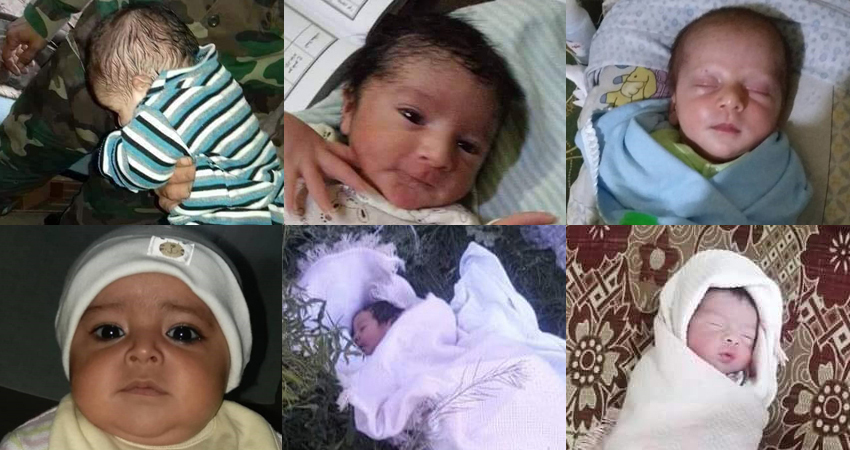Executive summary
Child abandonment has risen in several areas of the province of Idlib and northern rural Aleppo, which are controlled by armed opposition groups. From the beginning of the second half of 2019 until 20 July 2020, STJ field researchers documented 43 child abandonment cases.[1] The children, who were mostly newborns, were found dumped on street sides or near mosques or hospitals or in garbage dumps.
Child abandonment became one of the phenomena that those areas are beset with. Never a month or two passes without a report of two or three cases of this kind. Worse still, the death of some of those children as a result of being found late or owing to extreme weather conditions.
Poverty is the main reason which leads many Syrians to abandon their children, especially those in displacement camps, for not being able to meet expenses of supporting them. Marriage of minors is another reason for the spread of this phenomenon (STJ is preparing a detailed report on this issue).
In Idlib, which is mainly controlled by Hayat Tahrir al-Sham (HTS), most of the abandoned children were fostered by families from the city, since adoption is abandoned in Islam. Accordingly, it is not allowed to register those children on the names of the families fostered them, in the civil records of Idlib, which adhere to the Islamic law. However, this is possible in the neighboring regime-held city of Hama, but families refrain from going there for the fear of possible arrest by the state’s security forces. Children who are not fostered, are taken to orphanages and retirement homes.
In northern rural Aleppo (Euphrates Shield and Peace Spring areas),[2] the role of authorities responsible is still limited to run the procedures of handing over abandoned infants to families who want to foster them, with the ability to register them officially only in the civil records of northern rural Aleppo.
It is worth mentioning that STJ documented 40 cases of abandoned infants during 2018 and the first half of 2019 in Idlib and northern rural Aleppo.[3]
STJ field researchers warned that abandoned children would face serious consequences and bleak future, as they would be denied their rights to education and nationality; since they are not officially registered. Further, there are no guarantees that they will not be used, as minors, in labor or fighting, or to be subjected to discrimination and persecution in society amid the lack of any efforts from authorities to protect them.
1. High incidence of infant abandonment in Idlib
The province of Idlib has witnessed increased numbers of newborn abandonment cases, since the beginning of the second half of 2019 until the date of preparing this report; 20 July 2020. Those infants were found on roadsides or near mosques or hospitals or in garbage dumps.
This phenomenon is mostly spread in the towns and cities of Ad Dana, Kah, Atme, Salqin, Aqrabat and Jisr al-Shughur. STJ, however, suggests the true figure of the children abandoned to be far higher than that recorded, as it couldn’t document all of the cases in Idlib, especially those that occurred in its remote areas.
A. Two infants found abandoned in the town of Ad Dana within days
STJ field researcher in the town of Ad Dana reported, on successive days, two incidents of newborn abandonment. The first was found in a garbage dump on 19 May 2020, according to an individual from the town who detailed:
“A baby, just a few days old, was found abandoned at about midnight in the northern neighborhood of the town. People handed it over to the police station, which wrote a report on the incident. The infant was taken to a hospital for treatment and it was placed then with a foster family. Two weeks later, the police found the infant’s mother, who admitted giving up her infant for not being able to afford its milk. Though destitute, the police returned the baby to her.”
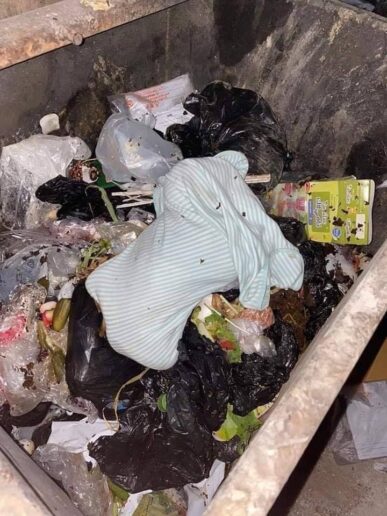
Image 1.
 Images 1 and 2: the newborn found dumped in a garbage dump in the town of Ad Dana, in rural Idlib, on 19 May 2020. Credit: media activists from Ad Dana.
Images 1 and 2: the newborn found dumped in a garbage dump in the town of Ad Dana, in rural Idlib, on 19 May 2020. Credit: media activists from Ad Dana.
On 23 May 2020, Ad Dana people also found a newborn girl wrapped in a cloth near Al-Farooq mosque. On this, a man, 55, from Ad Dana, who is married with no children said to STJ:
“When I found the baby girl I directly went to the imam of the mosque and we took it to the police station, which wrote a report on the incidents and tried to find her parents but in vain. Then I took her to my home; my wife was thrilled, and asked my brother’s wife to breastfeed her. My wife and I decided to foster her, and we called her Bara’a. But what really worries me is that I cannot register her officially on my name here in my town, because adoption is banned in Islam, and it is known how difficult to go to the state’s departments of civil registry. When she grows up, I will not tell her that her parents abandoned her, but rather I would say that they were killed in a bombing.”
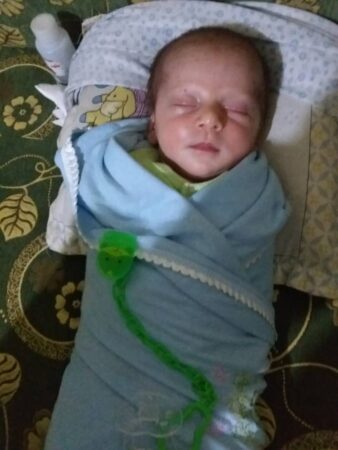
Image 3- Bara’a after being fostered by a family from the town of Ad Dana. Credit: a witness from Ad Dana.
B. An infant dumped near a garbage dump in Aqrabat, Idlib
On 21 February people of the village of Aqrabat, in rural Idlib, found a newborn near a garbage dump, wrapped with a white cloth. They took it to hospital, as it was in a poor health condition, and then informed the police who tried to find its parents, but with no avail.
Thus, the estimated 15-day-old newborn, was placed in the Sultan Abdul Hamid orphanage in the village. On this, a villager, 45, from Ma’aret Hurmah said:
“I don’t have kids, so when I heard about that abandoned infant, I hurried to the orphanage and initiated the procedures to foster it, and then completed them in the court of Atme. I took the baby with me to home; he was suffering bronchiolitis; my wife took care of him. We called him Abdullah and he became a member of my family, but unfortunately, I couldn’t register him officially in the civil records, since adoption is forbidden in Idlib.”

Image 4- Abdullah after being fostered by a family from the village of Ma’aret Hurmah in Idlib. Credit: the aforementioned witness.
C. Finding a newborn near a hospital in Ma`arat al-Nu`man
In early 2020, a worker in al-Salam hospital found about an hour-old- newborn dumped at the hospital entrance; he was totally naked. Yahya M., 32, married with three children, detailed STJ about this incident:
“I was at work when I heard colleagues talking about seeing a newborn at the door of the hospital. I rushed to take him; he was completely naked; I wrapped him with a cloth. We looked nearby for his parents but none of them were there. Doctors in the hospital checked on his safety. After work, I took him home and my wife breastfed him. We fell in love with him and decided, my wife and I, to raise him and to treat him equally with our three children, since then he became a member of my family. I’ve tried hard to find his parents but it was useless.”
D. A newborn found dead in a hole in the village of Bassams
In late January 2020, an hours-old newborn was found in a hole on the side of the road to the village of Bassams in rural Idlib. He was died of the harsh winter cold, as reported by a witness who recounted:
“It was afternoon, when a villager found a dead newborn in a hole. The infant was totally naked with his umbilical cord wrapped around his body. It seems that he died of bitter cold. The villager took him and buried him in the village cemetery. The police didn’t write a report on the incident or investigate it, or even tried to find the infant’s parents. This incident was not the first of its kind in the village of Bassams; a similar incident occurred in late 2019.”
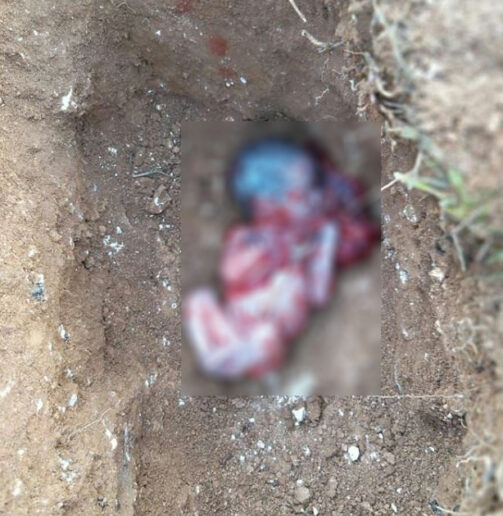
Image 5- the newborn found dead in a hole in the village of Bassams in rural Idlib in late January 2020. Credit: media activists.
E. On average, two or three children are abandoned monthly in Idlib
Informed sources in Idlib, including STJ field researchers, confirmed that two or three child abandonment cases have been recorded monthly in Idlib, since the beginning of the second half of 2019 to the date of this report, 20 July 2020, noting that there were many unreported cases.
Further, media activists from Idlib confirmed that the cities and villages of Ad Dana, Aqrabat, Ma`arat al-Nu`man, Jisr al-Shughur, Saraqib and Idlib saw an increase in the number of child abandonment cases; five cases occurred in Jisr al-Shughur, two in Kherbet Eljoz and one in Darkush, in rural Jisr al-Shughur; those children were fostered by families from the village.
The same source added that in October 2019 alone, two infants were found abandoned in Saraqib – one of them was frozen to death – and three at least in Idlib – they were fostered by families from the city, and went on to say:
“According to a social worker from Idlib, there are several reasons for the persistence of this phenomenon in the province, notably poverty, which is suffered by many families, especially those displaced at the border camps. The ongoing war and the falling living standards amid the current economic and financial crisis, which made families unable to support their children and hence to abandon them, are also further causes for this crisis.”
There is no doubt that the persistence of this phenomenon is due to the continuing displacements and early marriages of minors. Often, those children who are found abandoned are placed either in orphanages or fostered by families, who can’t register them on their names officially in the civil records of HTS – since adoption is forbidden in Islam – nor in the records of the Syrian government in Hama, for fear of arrest by security forces.
2. An increase in child abandonment cases in northern rural Aleppo
Not only Idlib, northern rural Aleppo also witnessed several cases of child abandonment led mainly by poverty, which prevented many families from maintaining their children and raising them properly, according to witnesses met by STJ.
A. Two infants found abandoned in Al-Bab
On 9 March 2020, people in the city of Al-Bab found a newborn left at the entrance to the al-Boushi mosque, with only a cloth wrapped around his body; the police wrote a report on the incident, as reported by a media activist in rural Aleppo:
“The investigation into this incident continued for nearly a week, and resulted in the find of the child’s mother, who had been displaced to Al-Bab a year ago. The police gave the newborn back to his mother, and launched an initiative to help her secure her child’s needs, since poverty was the reason which led her to abandon him amid the lack of income and the prohibitively high prices of basic foodstuffs.”, as she said.
On 21 March 2020, media activists circulated a video on the found of the aforementioned child near the al-Boushi mosque in the city of Al-Bab in northern rural Aleppo.[4]

Image 6- a screenshot from the abovementioned video.
This incident is not the first of its kind in Al-Bab, as on the morning of 12 March 2020, an infant was found in a garbage dump and died immediately since he was in poor health.
B. Finding a newborn abandoned in a travel bag in Kaljibrin
In the town of Kaljibrin of Azaz District, the young man Mus’ab Abdulhai found a newborn abandoned in a travel bag dumped on the roadside, while on his way to work on 28 March 2020:
“Initially, I got scared when I saw the bag on the roadside, because I thought it was an explosive device, as there are many those days. However, I heard cries coming from it so I came near it and saw a newborn inside. I took it then to the police, who questioned me about the incident and investigated it later. I learned that a nurse fostered the child.”
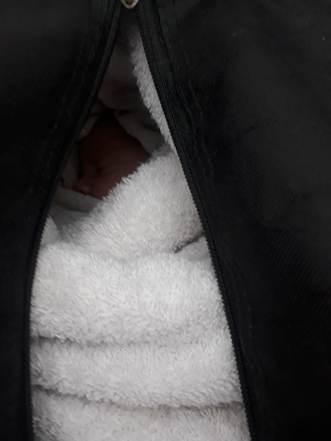
Image 7- the newborn found abandoned in the town of Kaljibrin of Azaz District on 28 March 2020. Credit: Mus’ab Abdulhai.
Khadija M. a medical worker in the health sector of Azaz fostered the child after being taken to hospital:
“I have always heard about abandoned children and ever wanted to adopt one. That day I was busy doing my work at the hospital when policemen brought a baby to examine him. I rushed to them and asked if I could foster that baby; they said yes. So, I went to the court to start the procedures. I have no children and I believe that God compensated me with this baby. After I registered him in the civil records, I vowed that I would protect him, take care of him and raise him as if I were his real mother. I would teach him everything and wouldn’t tell him his story as a child, to not to feel inadequate among his peers; I would wait until he becomes a man and knows that the real mom is not who gives birth, but the one who raises.”
It is worth mentioning that on 21 January 2020, a similar incident occurred in Azaz, when a five-month-old baby was found near the Maternity and Obstetrics hospital by the medical staff. STJ field researcher reported that the baby was fostered by a family, who refused to give him a statement.

Image 8- the child found near the Maternity and Obstetrics hospital in Azaz in January 2020.
Credit: local pages on social media.
C. Never a month or two passes without a report of a child abandonment case in northern rural Aleppo
According to knowledgeable sources, never a month or two goes by without the record of at least one case of child abandonment in northern rural Aleppo, which means that no less than 13 children were abandoned since the beginning of the second half of 2019 until the date of this report; 20 July 2020. The source added that those children are registered as of unknown parentage in the civil records of the district of Azaz under fake names or names chosen by families fostered them.
A social worker in northern rural Aleppo attributes the exacerbation and the spread of the child abandonment phenomenon to the deteriorating living conditions of the population as a result of the military operations and the security chaos that led to waves of displacement, turning thousands of productive people to only consumers. The social worker said that the phenomenon recedes is subject to the return of stability and the improvement of living conditions and he stressed the importance of raising awareness on limiting reproduction by the use of inexpensive means, and not to bring children with the aim of getting more aid. Moreover, it is necessary to establish orphanages providing care for those abandoned children and to induce families, who have the financial ability, to foster them. He also pointed out that this phenomenon cannot be eliminated even after the end of the conflict, but it can be greatly reduced through a package of punitive, educational and economic measures.
3. Prevalence of child abandonment in government-held areas
Areas under the control of the Syrian government, specifically the provinces of Daraa, Damascus and Aleppo, also witnessed high numbers of child abandonment cases. On 11 April 2020, members of the Syrian Army found an infant dumped on a roadside in Daraa, in stormy and rainy weather, and took him to the national hospital, as reported by a local news network.[5]
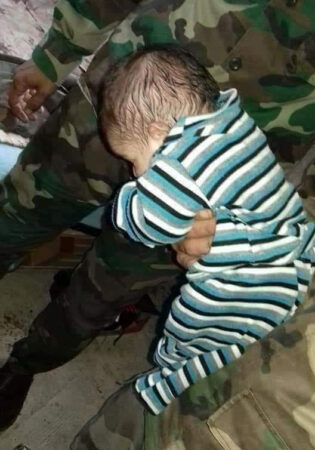
Image 9- the child found dumped on a roadside in Daraa on 11 April 2020. Credit: local news networks.
Media activists also reported that a newborn baby was found dumped on the road to the Nahr Eshe neighborhood in the city of Damascus on 8 April 2020.
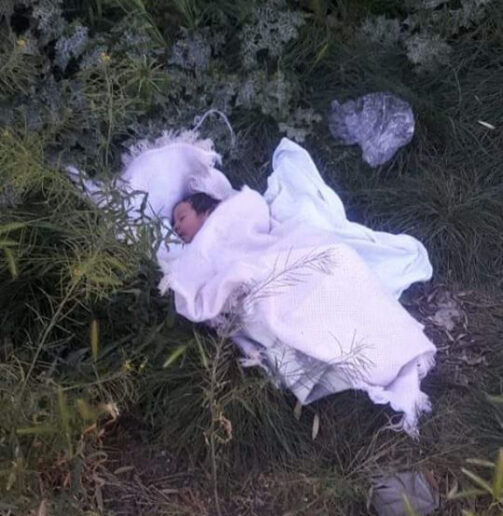
Image 10- The newborn found dumped on the road to Nahr Eshe neighborhood in Damascus. Credit: media activists.
Local social media pages reported the find of a newborn on a pavement in the government-held town of Maskanah, eastern Aleppo, on 27 April 2020.
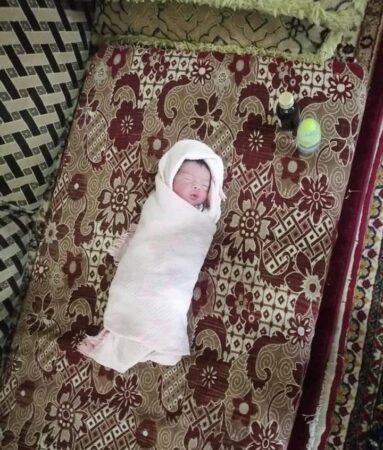
Image 11- the newborn found dumped on a pavement in the town of Maskanah, eastern Aleppo. Credit: local social media pages.
On 21 September 2020, Arta FM reported the find of a child abandoned at the entrance to a building, between the neighborhoods of al-Syiahi and al-Kournish in the city of Qamishli,[6] in the province of al-Hasakah, controlled by the Autonomous Administration. No birth documents were found for the baby, so his parents weren’t identified, and he was thus handed over to the female Asayish forces in order to be placed in foster care.
[1] STJ field researchers confirmed that the numbers are expected to rise, especially since they could not confirm cases occurred in remote areas.
[2] These areas were taken over by the Turkish-backed National Army, who took control over the city Afrin and the town of Jindires during Operation Olive Branch, which it waged on 22 January 2018, while it captured the cities of Jarabulus and Al Bab following Operation Euphrates Shield, which it launched on 5 September 2016. The most prominent formed factions of the National Army are; the Levant Front/ al-Jabha al-Shamiyah, the Sultan Murad Division, the Northern Storm Brigade and Ahrar al-Sharqiya.
[3] “I don’t Know if I’ll Tell her the True Story or Not”, STJ, 15 July 2019, https://stj-sy.org/en/i-dont-know-if-ill-tell-her-the-true-story-or-not/ (last visit: 13 July 2020).
[4] For more info please check: https://www.facebook.com/watch/?v=656812755090873
[5] For more info please check: https://www.facebook.com/yomyat.damas.syr/photos/a.100441468301892/103710524641653/?type=3&theater
[6] “A newborn found abandoned on a street in Qamishli” ARTA FM, 21 September 2019, http://www.artafm.com/news/18125?fbclid=IwAR2M-Rif5xXc8ZZ7C2fhIIfE8c3hRdmrdtav-QeslUB_jurUGSgcuSb8DZo (last visit: 10 July 2020).

